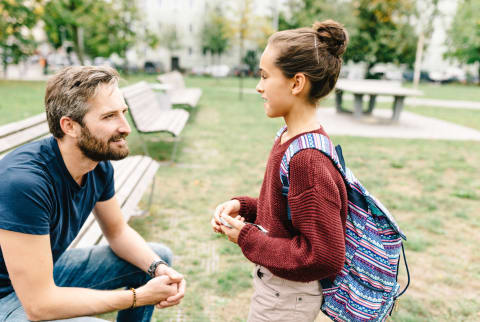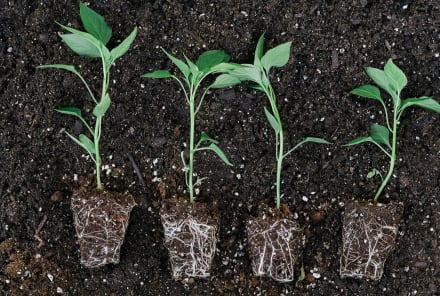Advertisement
What's The Best Way To Talk Climate Change With Kids? Experts Weigh In


"This is not a one-time thing. This is our entire future."
When 16-year-old activist Greta Thunberg said this in reference to the youth climate movement back in April, she spoke for an entire generation of people who see their livelihoods directly threatened by climate change. Even though the majority of Gen-Z'ers (ages 7 to 24) aren't yet able to vote, they're making their voices heard through historic strikes, climate change lawsuits, and advocacy campaigns.
"We're seeing the youth rising up, getting very vocal, and taking a stance because they're inheriting a sustained crisis," Katie Hayes, a Ph.D. candidate studying the effects of climate change on mental health, explains. "They're very worried about their well-being and their future—as they should be."
Eco-anxiety among young people has recently been fictionalized on shows like Big Little Lies, but it's a very real thing. Hayes points to one study that found that following the Fort McMurray wildfires1 in Canada, those under the age of 25 were more likely to experience feelings of impending doom, stress, and anxiety than older populations.
"[They're] tasked as the ones who need to forgo their youthfulness and go on the picket lines to protest the inaction by government and adults in the room," she adds. "That's a heavy burden to bear, and it comes with a lot of complicated emotional responses."
Here's a primer on how we can hold space for kids as they grapple with climate change and its role in their lives.
Be honest with them about the scope of the problem.
According to Margaret Klein Salamon, an environmental activist, clinical psychologist, and author of the upcoming book Facing the Climate Emergency: How To Transform Yourself With Climate Truth, any honest conversation about climate change starts with—well—honesty. Shielding young people from the scope of the problem out of fear of scaring them could ultimately do more harm than good.
"We want to protect them from pain, and that's a good impulse," Salamon says. "But what we need to prioritize is actually protecting them from the climate emergency." That means first and foremost establishing the fact that climate change is a very real threat that's already putting people in danger—but reminding them you're always there to talk about it. Of course, this conversation will look a little different with really young kids, but even then you should lead from a place of truth.
Be sure to let them know that they can get involved.
Once you establish the problem, it's time to talk solutions: "Yes, we need to continue to ring the alarm, but it's vitally important to pair any messages of alarm with how you can get active and what kinds of resources are available to you," Hayes adds.
In order to stave off what researchers are now dubbing eco-paralysis (the inaction that stems from the feeling that climate change is too massive an issue for any one person to do anything about), the next step is talking about what actions the children in your life can take. Hayes recommends prompting them with the question, "What actions are going to feel meaningful in a big way for me?" You can also help them talk through how their unique talents may suit the climate movement. If they love the outdoors, maybe they could help start a veggie garden at home, for example. If they're a people person, perhaps they'd want to organize a petition to get their school to take an eco-action.
Always hold space and be a role model.
Both Hayes and Salamon stress the importance of keeping the lines of communication open about climate change. Let kids know that they shouldn't bottle up the worry or frustration they're feeling on behalf of the planet. (Adults shouldn't be doing this either, by the way.) "Let them talk about their feelings so they don't feel alone with them," Salamon says.
Lastly, we have a responsibility to model eco-friendly behavior at home. "People should push themselves to be the hero their child needs them to be so they can then honestly tell them, 'The situation is bad, I am very worried, but I am doing everything I can to protect you and make a better future.' That's what kids need more than happy stories," Salamon says. Start today by joining the inspiring young people protesting for our planet through the Global Climate Strike, either virtually or in person.
"Our youth is teaching us quite a strong lesson about what it means to come together with your peers and really advocate for the changes you want to see," says Hayes of the upcoming strike, which has caught the attention of major companies who are closing their doors today such as Lush, Seventh Generation, Ben & Jerry's, and Patagonia. "It's important for all of us to be allies and support them in this and make sure their voices continue to be heard."











